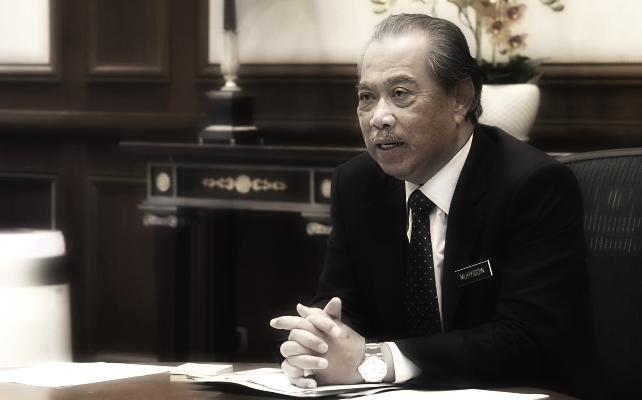
By Kuik Cheng Kang, Sin Chew Daily
Many people are asking whether a snap election will be held this year. With probably a million Malaysians out of work by end of the year, what is the best timing to hold an election?
Such questions have been lingering not only in our heads but also that of our prime minister.
Muhyiddin needs to seize the right moment to dissolve the Parliament, if he does not want to become the most short-lived PM in the nation's history.
He had an extremely narrow win in the replacement of the Dewan Rakyat Speaker on July 13, and this shows that indeed he only has the support of 113 lawmakers. With a very tight 113 vs 109 margin, Muhyiddin's PN government is extremely weak and vulnerable and could be brought down anytime a couple of MPs decide to jump ship.
Neither Muhyiddin nor his PN government could rest assured that the crisis is now completely defused, especially when Umno keeps making threats. The 113 seats Muhyiddin has in his command are by no means a sure bet.
The question is: when is the best time to call an election? How much confidence does Muhyiddin have in dissolving the Parliament?
Indeed, it is a priority task for Muhyiddin to seek a legitimate mandate from the electorate, but this must not be done hastily in view of a multitude of challenges confronting him right now.
It has been said that Muhyiddin is boosted by the encouraging results of a recent approval rating study conducted by an independent institution. This could have been one of the major reasons he has opted to hold a snap election this year.
According to the survey, Muhyiddin's approval rating among the Malays is 94%, thanks to his outstanding performance in containing the coronavirus. As many as 57% of Indian correspondents also support him while only 26% in the Chinese community approve of his performance. Muhyiddin also enjoys 94% approval in East Malaysia.
On his relatively poor showing among Chinese Malaysians, Muhyiddin is said to have told his cabinet not to give up the Chinese. If he is really serious about being a prime minister for all Malaysians, he needs to work much harder to win the hearts of Chinese voters.
If the survey results can be converted into votes, Muhyiddin should be able to take his PN government to win the election with ease, and securing two-thirds majority is not a total impossibility.
But the question is, can he handle the power-hungry Umno? His biggest challenge now is to persuade his allies, in particular Umno, to agree to contesting in the election under the "Perikatan Nasional" banner and settle the most intricate seat allocation issue.
Umno's move and choice will determine whether PPBM can go on with Umno, or form a new alliance to fight the election war.
Unlike in the past, Umno now has three different options.
First, to contest under the well established "Barisan Nasional" banner alongside MCA and MIC.
Second, to take BN along in forging a "Muafakat Nasional" alliance with PAS.
Third, take the second option to contest under the "PN" banner.
Umno has yet to agree to contest under the "PN" banner, which is both Muhyiddin's option and bottomline.
Umno will need to weigh the pros and cons. If it decides to contest under the "PN" banner, it will be the first time since the party's inception that it has lost its commandership in a general election. This will constitute an utterly cruel and unacceptable political sacrifice for the party. It will be an uphill task, at least at this juncture, to persuade the grassroots to surrender some of their traditional seats to Muhyiddin's PPBM.
Initial seat allocation negotiations have been unsuccessful and voices of disagreement among the grassroots are loud. After the "Tak laku di Sabah" comment by rural development minister cum MP for Mersing Abdul Latiff Ahmad, Umno leaders have put it very strongly that they would not surrender the Mersing and Larut (held by home minister Hamzah Zainudin) parliamentary seats to PPBM.
Umno will enjoy better chances of being retained in Putrajaya if it opts to fight its own in the Muafakat team. Given Umno leaders' arrogant posture, there is strong possibility this will become a reality. PPBM is nothing to Umno because they believe they can win the election by working with PAS, MCA and MIC alone.
If Umno is not prepared to compromise, Muhyiddin will have no choice but to look for new allies, Anwar Ibrahim being a potential partner. If this happens, there will be three groups jostling for supremacy in the end, with Umno-PAS, Muhyiddin and his new allies, and PH++ which has yet to finalize a PM candidate.
Sure enough Umno's leadership, which was gravely humiliated for almost two years after losing the election, will be cautiously evaluating the situation before making a strategic move.
In a similar manner, Muhyiddin will have a hard time forcing Umno into submission, even though this is not outright impossible. Perhaps he has the miraculous power to convince Umno leaders to fight alongside him.
From what we understand, although Umno still finds it difficult to accept PPBM's dominance, at least for the time being it has accepted Muhyiddin as PM candidate. This shows that barring any unforeseen circumstances, there is still room for both sides to negotiate and cooperate.
With the debt moratorium ending in September, it is foreseeable that the massive layoffs that ensue will bring a host of tacky problems, giving Muhyiddin very limited options to choose from.
Of course, the presence of a third wave of coronavirus infections and other factors may also affect the PM's decision whether to call a snap election this year.
That said, given the extremely thin majority of the PN administration now, Muhyiddin does not have enough ammo to defer GE15 to next year or even 2023.
He must make a firm decision to seek fresh electoral mandate in order to take the nation through the economic slump from the coronavirus outbreak, by banking on his personal popularity right now.
As such, the agenda for a snap election within this year is almost laid on his table.
ADVERTISEMENT
ADVERTISEMENT


































